




Week of: September 19, 2024
























TSU improved to 3-1 on the
while UAPB dropped to 1-3. — Page 10









Week of: September 19, 2024
























TSU improved to 3-1 on the
while UAPB dropped to 1-3. — Page 10





POSTMASTER: Send address changes to The Tri-State Defender, 1509 Madison Ave., Memphis, TN, 38104.
GENERAL INFORMATION: Inquiries may be submitted in writing or by calling (901) 5231818 or by email. TELEPHONE: (901) 523-1818.
The Tri-State Defender (USPS 780-220) is published weekly.
The Tri-State Defender 1509 Madison Ave. Memphis, TN, 38104. Second-class postage paid in Memphis, TN.
‘The truth needs to come out’
By Adrian Sainz Associated Press
Saying he can’t live with a lie, a former Memphis police o cer testi ed Tuesday that he punched a “helpless” Tyre Nichols at least ve times while two colleagues held his arms and said, “hit him,” then lied to his supervisor about their use of force in a beating that proved fatal.
Emmitt Martin III testi ed that he was at the tra c stop on Jan, 7, 2023, when Nichols was pulled over and yanked from his car. Nichols ed, and Martin said Tadarrius Bean and Justin Smith gave chase and were punching the 29-year-old man without their handcu s out when Martin caught up with them.
“ ey were assaulting him,” Martin said Tuesday.
Bean, Smith and Demetrius Haley have pleaded not guilty to charges that they deprived Nichols of his civil rights through excessive force and failure to intervene, and obstructed justice through witness tampering.
e four men, along with Desmond Mills Jr., were red a er Nichols’ death.
e beating was caught on police video, which was released publicly. e ocers were later indicted on the federal charges. Martin and Mills have taken plea deals and are testifying against their former colleagues.
“I can’t sit here and live with a lie. e truth needs to come out,” Martin told Prosecutor Kathryn Gilbert. “It was eating me up inside.”
Martin said he threw his body camera on the ground because he didn’t want to show “we were assaulting Mr. Nichols.”
Martin said he kicked Nichols, while Mills hit him with a baton. en Martin said he punched Nichols at least ve times while Bean and Smith held his arms and urged Martin on.
O cers were holding his arms while also commanding him to give them his hands.
“He was helpless,” Martin said of Nichols.
Under cross examination by Bean’s lawyer, John Keith Perry, Martin said he had been injured in November 2022 when he was hit by a car, and he had only returned to the Scorpion Unit four days before the Nichols arrest. While Martin was away from his team, Justin Smith called and Martin told him he was having homicidal thoughts, Martin said.
Martin also said he had been diagnosed with post-traumatic stress disorder, with problems including trouble sleeping, paranoia, irritability
and anger issues.
Perry tried to show inconsistencies between Martin’s previous statements to investigators and his court testimony.
He pressed Martin about his wording in court, such as “exaggerate” and “passive resistance,” suggesting Martin only used that language a er lawyers guided him on his testimony. Martin acknowledged he did not use those words when speaking with internal a airs investigators in the days a er the beating, adding that he was not being truthful at that time.
(Associated Press reporter Jonathan Mattise contributed from Nashville, Tennessee.)



By TSD Newsroom
e 17th Annual Economic Development Forum (EDF) hosted a powerful conversation between Joann Hill, Director of the O ce of Customer Experience at the Minority Business Development Agency (MBDA), and Jozelle Booker, CEO of the MMBC Continuum, the organization behind the event.
eir discussion centered on strategies for growing minority-owned businesses, the importance of strategic partnerships, and how to leverage federal opportunities for business expansion.
e MMBC Continuum has been a transformative force in the Memphis business community, helping minority businesses secure over $100 million in contracts in the past year. Booker, known for her leadership and expertise, emphasized the importance of these partnerships and highlighted the crucial role local businesses play in the national economy.
“We talk a lot about building bridges, but it’s also about being prepared to cross those bridges when the opportunity arises,” Booker said, urging businesses to think beyond local markets. “You can’t just look at Memphis; you have to expand across state lines and even internationally. e world is your marketplace, and MMBC is here to help you get there.”
Hill added to this, outlining how the MBDA is the only federal agency dedicated solely to fostering the growth of minority and disadvantaged businesses.
“Our role is to create pathways for businesses to compete globally, not just locally.” — Joann Hill, MBDA
“Our role is to create pathways for businesses to compete globally, not just locally,” Hill said. “ rough partnerships with public and private sectors,



“We don’t just help you secure contracts—we help you manage that growth so you don’t outgrow your financial capacity.”
— Jozelle Booker
“We have 131 business centers across the country, including 41 focused on business growth and 43 capital readiness programs,” Hill said. “ ese centers are designed to help businesses access everything from startup capital to venture capital, providing them with the nancial support needed to scale e ectively.”
are prepared to succeed in them.” Hill echoed these sentiments, adding that businesses must be “future ready.” She urged minority business owners to explore emerging markets, including AI, space commerce, and the green economy.
“ e green economy isn’t going anywhere,” Hill said, referencing partnerships with the U.S. Department of Energy and the Environmental Protection Agency. “Businesses that are prepared to engage in clean energy and sustainability are positioning themselves for long-term success.”
like the one we have with MMBC, we ensure businesses have the resources they need to scale.”
Hill highlighted key partnerships with organizations such as Amazon and FedEx, which help businesses distribute products globally, and the U.S. Department of Defense, which provides contracting opportunities. She also announced a new joint initiative with the U.S. International Trade Administration to assist businesses in expanding internationally without needing a physical presence overseas.
Booker, a dynamic leader, emphasized that while securing contracts is vital, businesses must also focus on capability and readiness. She underscored the importance of industry-speci c certi cations, such as ISO or Lean Six Sigma, which elevate a business’s credibility and competitive advantage.
“Certi cations are essential,” Booker said. “Whether you’re looking to work with corporate America or the federal government, having the right certi cations is a must.”
One of the key points Hill emphasized was the MBDA’s vast national network of resources.
Hill also said that the business centers can help smaller businesses connect across state lines to go a er larger contracts that they would be too small to handle on their own.
e MBDA also o ers specialized centers focused on exports, advanced manufacturing, and federal procurement, ensuring minority businesses have tailored support for growth in a variety of sectors.
Booker and Hill both stressed the importance of businesses being prepared for the future. Hill discussed how federal initiatives like Executive Order 1395, which mandates a 50% increase in federal spending with underserved businesses by 2025, open up signi cant opportunities.
is is especially relevant with the in ux of funding from the Bipartisan Infrastructure Law, which allocates more than a trillion dollars for projects in areas like construction, transportation, and technology.
“Don’t think small,” Booker encouraged the audience. “Memphis is important, but so is your role in the global economy. e MBDA and MMBC Continuum can help you not only secure these contracts but also ensure you
In line with this future-oriented thinking, Hill pointed out that many corporations are adopting a “triple bottom line” approach, which focuses not just on pro tability but also on social and environmental impact.
“It’s no longer just about nancial returns,” she said. “Corporations now want to know how their partnerships are bene ting communities. is is why being involved in community service and sustainability is crucial for businesses today.”
e conversation also delved into nancial literacy and the importance of understanding cash ow and capital readiness. Booker highlighted MMBC’s role in ensuring businesses can grow sustainably.
“We don’t just help you secure contracts—we help you manage that growth so you don’t outgrow your nancial capacity,” Booker said, reinforcing the importance of being able to access the right capital for expansion.
Hill concluded by encouraging attendees to explore the vast resources available through both the MBDA and MMBC.
“ ese are tools designed to help you grow your business, not just in Memphis but globally. Don’t let borders limit you—this is your time.”


Cody in 2018
‘We didn’t think there would be any history books about this’
By Lee Eric Smith Interim Editor
Editor’s Note: On Tuesday, Sept. 15, e Tri-State Defender learned of the death of W. J. Michael Cody, an attorney in the 1960s and a key ally of Dr. Martin Luther King Jr. during the 1968 Sanitation Strike. He also served as Tennessee’s Attorney General and U.S. Attorney for the Western District of Tennessee. His legal career spanned decades, marked by his integrity, dedication to justice, and commitment to public service.
In 2018, as part of our coverage of MLK50, I sat with Mr. Cody in his o ce in Downtown Memphis for the following story. We bring it forward again out of respect for him, his work, and his legacy. — LES
In a long but necessary string of legal actions during the Civil Rights Era, a motion to allow Dr. Martin Luther King Jr. to lead an April 5 march in Memphis was pretty routine, legally speaking.
“One thing that people don’t understand is that on April 3 and April 4, Dr. King was a signi cant person, but (getting an injunction li ed) wasn’t any big, big deal,” said J. Michael Cody, who was on King’s Memphis-based legal team in 1968. “So, we were looking at it as just a case for sort of a controversial person that would be over as soon as the court either li ed the injunction or said, ‘Dr. King, you’ll have to march in the face of the injunction and we’ll arrest ya.’
“We didn’t think that there’d be any history books about this,” Cody continued in an exclusive talk with e New Tri-State Defender. “It was only when Dr. King was killed that gave this so much signi cance, including his last speech.”
By his own admission, Cody was a novice attorney at the time. “I was there mostly to carry Mr. Burch’s books,” he chuckled as he pointed himself out in a photo that included his boss and mentor Lucius Burch, along with King’s lieuten-
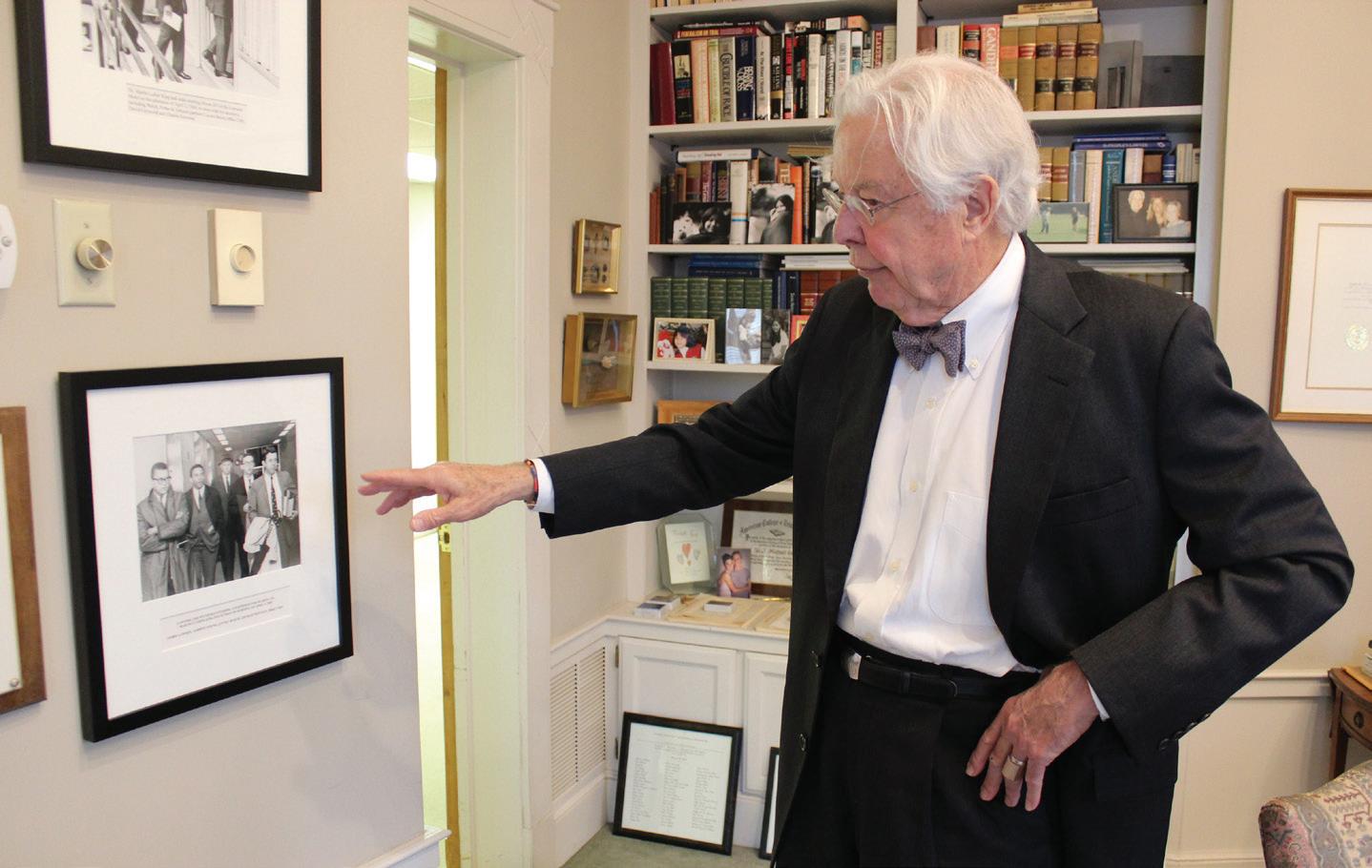
ants, Andrew Young and James Lawson. Cody said he had been present at meetings with Dr. King in the mid1960s, but only met him for the rst time on April 3. By that point, an earlier scheduled march had veered toward violence and rioting. King brie y led the march, but was whisked away, to avoid him being associated with the violence.
Despite the romantic notion that Black America was united behind nonviolent change, the fact is that some Black Power activists were fed up with being brutalized for walking down a street. at, combined with the underlying economic injustice embodied by the Memphis Sanitation Workers’ Strike, created an air of tension when Dr. King arrived in Memphis in April, Cody said.
“His popularity was beginning to shi from just being the civil rights leader to opposing the Vietnam war, talking about minimum wage guaranteed payment, the economic part,” Cody said. “ at’s why he was so keen
about Memphis. ( e strike) was a poverty issue more than it was a civil rights issue. e demonstration was a civil rights issue, but the poverty of the garbage workers was the reason that he was there.”
And so there Michael Cody was in Room 306 at the Lorraine Motel on April 3 — along with Lawson, Young, Burch, Ralph Abernathy, Jesse Jackson and others. He recalls King feeling pressure to prove that nonviolence could still work.
“He said, ‘You know I’m being criticized that I can’t lead a peaceful march, non-violently and get results for these sanitation workers.’” Cody said. “‘If I can’t show I can do that, my whole history is history and I can’t do it in Washington.’
“‘I have got to show that it’ll work because if I don’t, the young people will turn to the Black Power.”
And then a shot rang out on April 4. “And it was all over,” Cody said.
When King was shot, riots broke out in Northern cities, including Detroit,
Chicago and Washington, D.C. And while there was unrest in Memphis, leaders like Lawson and Memphis icon Benjamin Hooks issued a critical call for order, Cody said.
“Jim Lawson, Ben Hooks and the other people got on the radio and on the television here in Memphis and said, ‘Riots are breaking out in other parts of the country. e worst thing that could happen in Memphis is for people to resort to violence and riots because that would dishonor everything Dr. King lived his life for. Dr. King would want you to be respectful and get on with carrying on his legacy, not tearing up things in Memphis.’”
Soon a erward, a federal court li ed the injunction preventing a march in Memphis. And just four days a er the fatal shot, Coretta Scott King returned with her family for a silent march.
“ at’s the only march that took place in Memphis a er Dr. King’s death,” Cody recalled. “ ousands of people marched from Clayborn Temple on up Main Street to City Hall. You had people like Harry Belafonte and Dr. Spock and Andy Young, you know, all the civil rights leaders were here.”
And even though he only met King in his nal hours, Cody marveled at how mundane that April 3 meeting in Room 306 actually was.
“I expected Dr. King to be articulate, learned, smart, charismatic. And in that meeting with him, he was all of that and more,” Cody said. “But, the di erence was, (just like) you and I are sitting across the table having a talk, in that room for those hours, it was just Lucius Burch and Dr. King and occasionally Andy Young talking about why the march needed to take place, what they wanted to prove by having the march, what we needed to do to get the court to authorize it.
“ ere were no big speeches or anything else,” Cody said. “It was just a conversation.”


By Alexia Nastasia Planet Forward Climate Fellow
Senegal at a crossroads: Economic prosperity or climate protection?
“In electing me, the people of Senegal have decided on a break with the past,” said Bassirou Diomaye Faye in the rst interview a er his election as the president of the small but geostrategically important nation in Western Africa.
In the midst of the “Free Sudan” and “Free Congo” movements, an ampli ed focus on African struggles has echoed through the American and European publics. Meanwhile, Senegal has also had a glimmer of hope to remedy some of the problems that have burdened its people in recent decades.
In 2023, the country’s youth mobilized in protests aimed at opposing the e orts of then-president Macky Sall to stay in power for longer than two mandates, and in 2024 the country elected its youngest president to date, Diomaye Faye, as part of a le ist movement that promises to eradicate corruption and increase economic justice.
However, one particular dilemma has arisen: is the move toward more progressive economic policies harmful to the environment? Or must a break from the past be accompanied by environmentalism?
Such questions have become pressing


Editor’s Note: The following story comes to The Tri-State Defender via award winning journalist Jesse J. Holland, a Mid-South native and currently a professor at George Washington University in Washington, DC.

particularly as the new administration has promised to begin working with Australia’s Woodside LNG, a liquied natural gas company and a large contributor to fossil fuel pollution, to ensure that Senegal’s natural resources are utilized to increase the nation’s prosperity.
Pollution is a persistent problem
Long before the election of Diomaye Faye, pollution has been a problem, especially in the capital city of Dakar. Walking through Dakar, one may walk past market stands full of fruits and vegetables, bustling streets lled with
people proudly donning traditional clothing, and speedy motorcycles zooming through the busy tra c.
But exploring the city quickly turns painful due to the immense amount of smog generated by second-hand cars brought from European countries and burning trash. In 2019, prior to the pandemic, BBC reported that air pollution levels were exceeding by more than seven times the World Health Organization’s limits of particulate matter (PM), and according to the United
Holland, a longtime colleague and friend who had a stellar career with The Associated Press, is mentoring the inaugural cohort of the Planet Forward Frontline Climate Fellowship, college students who report environmental stories from, by, and about underserved communities on the front lines of climate change and environmental inequity.

Alexia Nastasia, a sophomore at Boston University, files this report about Senegal, a West African nation at the brink of an economic boom. But how will the opportunity impact it’s poorer and more remote populations? If you are from Senegal or another African nation facing similar challenges, we want to hear from you! Email me: lesmith@tsdmemphis. com.
— Lee Eric Smith, Interim Editor
Nations Environment Programme the situation has only worsened since. With the capital city of Dakar already struggling with decreasing air quality, what do people in Senegal have to say about the choice between progress in the Western sense and the promise of additional revenue versus the need
to preserve the peoples’ and climate’s health?
Kéba Djibril Mané, who teaches French, Wolof, and several other languages spoken in Africa to foreign students a liated with the Peace Corps and additional international programs in the city of Dakar, said he is appalled about the pollution situation in Senegal.
“Pollution has reached an extraordinary level,” he said. “I know many people who have health problems because of pollution. And this pollution is largely due to cars. You wait for a taxi in the street. A car passes, but there is smoke. Everyone is a ected.”
A Choice between health and opportunity
Beyond his passion for languages, Djibril Mané is also interested in politics because he has seen the e ects pollution can have on health and wants to see this issue being addressed e ectively by the country’s leaders. His sister-in-law, the wife of his older brother, became sick from the air pollution in Dakar. Because she developed a respiratory disease, he said, her family


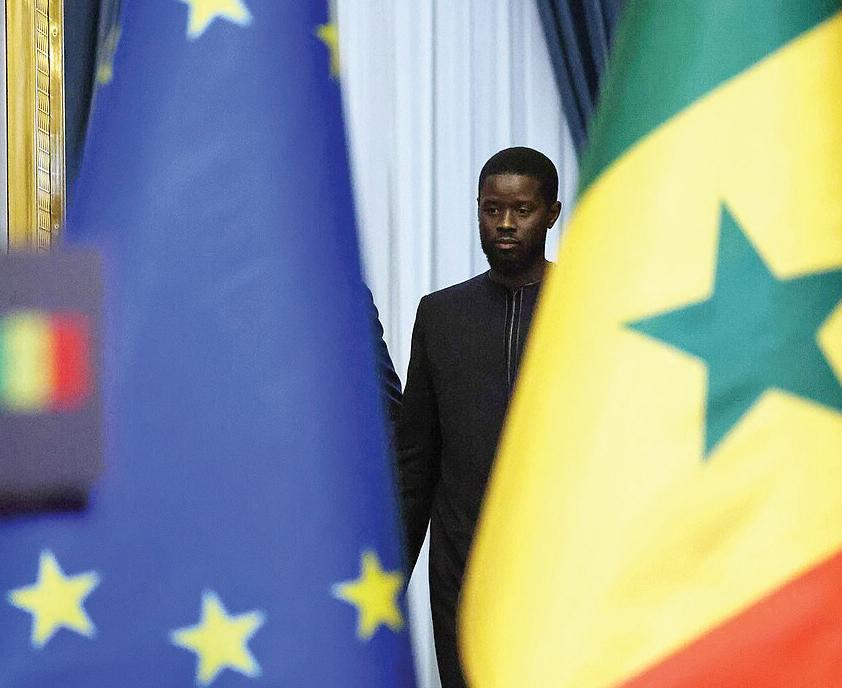
had to move to a rural area where there are fewer economic opportunities but the air is cleaner.
Stories like that of Djibril Mané’s sister-in-law are common in Dakar. In an article published in e New York Times in 2019, the chief of the pulmonology unit at a hospital in the capital of Senegal was quoted stating that asthma is one of the main childhood diseases in the city and that over a third of the city’s population has some form of lung disease.
Moreover, according to an article published in the Journal of Pulmonary and Respiratory Medicine in 2019, there is a direct correlation between the poor air quality and the prevalence of respiratory manifestation in Dakar. Speci cally, during a six year period (2011 to 2016), nearly 350,000 patients in Dakar were treated for respiratory symptoms, which gradually increased over time. e manifestation of both upper and lower respiratory diseases was strongly correlated with exposure to sulfur dioxide (SO2) and nitrogen dioxide (NO2). Due to the poor quality of the air in Dakar, children and adults
were likely to not only contract a range of respiratory illnesses, from cough and acute respiratory infection to asthma, bronchitis, and angina, but also to have persistent forms of such diseases and recurrent outbreaks.
According to Djibril Mané, pollution has become such a prevalent issue that many have realized the masks of the COVID era should be worn all year around for protection not against viruses but against the toxic substances in the air.
“You have to hide your face in your sleeve, we cover our faces like that a er about a minute on the street. Even today, there are people who wear masks,” he said. “Now, people are used to the masks because of COVID, and COVID came and went, but people have continued to wear masks. I have. If you ask why you want to put on the mask again, it is very useful, not only to protect yourself against COVID, but for dust, pollution in general during the day. When I go to town, there are too much dust, fumes, toxic gases, etc.”
Djibril Mané said he is aware that second-hand cars constitute one of the biggest sources of pollution in Senegal and overall in Africa. He also knows a key reason for this pollution is that European nations such as France impose bans on older cars, but that countries in Africa then import those refurbished cars from Europe.
“It’s not just cars by the way, it’s a lot of things. Many things are imported second-hand, there are TVs like that, large or small. ere are refrigerators and there are gas stoves and other materials which are not within the environmental standards at the international level, they are prohibited for use in Europe,” he said. “When they can no longer use them in France, they say OK, we cannot use them in France, but we will use them among Africans.”
“Not good for health. What should we do instead of destroying them? Recycle them?” Djibril Mané said.
“ ere is the buñuul. It means black in Wolof. is is what French people
call Africans pejoratively. He’s a Wolof. It is the only Wolof word that is in the French lexicon.”
“France has the right to choose that it needs good health for its population and it needs a good environment for its population. But Africa doesn’t have that right. is is the inhumanity, the lack of humanism, of neocolonialism.”
While Djibril Mané is not opposed to developing new economic opportunities such as those related to natural gas, he thinks the association with Western companies for such endeavors will not lead to success. He said he views Western countries and companies as entities that seek to keep Africa in poverty and Africans marred by disease both by exporting used products to Africa and by exploiting Africa’s natural resources.
‘Everything they do on other continents, they don’t do in Africa the same’
“Unfortunately, Western policy toward Africa is much more based on racism, because o en everything they do on other continents, they don’t do in Africa the same,” he said.
El Hadji Faly, a college student who is interested in the betterment of African youth, mental health, and environmental action, and who published the book erapy Is Banned In Africa, is somewhat more optimistic about environmental aspects in Senegal.
In high school, Hadji Faly had the opportunity to live and learn in the United States for a year and to compare the environmental situation in American and African settings. Moreover, in 2023, to continue his studies during the political protests, he transferred from a university in Senegal to a university in Rwanda, which allowed him to consider how pollution fares across African countries. Hadji Faly thinks there are both challenges and opportunities in regards to environmental issues in Senegal.
Hadji Faly acknowledges the negative impact that pollution has long had in Dakar.
“Yeah, it was de nitely a problem
From Page 7
because I have allergies, unfortunately. So when I was living in Dakar, it was really tough sometimes because of all the smoke coming from the cars and the buses. It really a ected my health and wellbeing,” he said.
However, Hadji Faly also feels that pollution in Dakar has come down a little since the introduction of electric buses. e city “just got a bunch of electric buses, but the old ones are still in use,” he said.“If we could get rid of the old ones and keep the electric ones, it would be really good for the environment. I guess it’s a process, but we can get there.”
In March 2024, Dakar launched its Bus Rapid Transit (BRT) system which the administration claims to be leading the way for African cities. It is a nearly 20-kilometer (approximately 12.5mile), fully electric bus system that according to the Institute for Transportation and Development Policy in Dakar is expected to carry 300,000 passengers a day, reduce travel time per person to nearly half, and shi toward zero emission urban transport. With access to public transit, o cials hope residents of Dakar will use private vehicles less and thus contribute to the improvement of air quality.
Djibril Mané agrees that electric buses provide some relief from pollutants, but he also thinks it is too little, too late.
“ is is precisely the problem. We are in the 21st century. ose are tools that existed in other countries more than 20 years ago,” he said.
In his view, Senegal should be at the forefront of environmental innovation, but Western European countries are not allowing African countries to develop and adopt new technologies at the pace needed to mitigate environmental issues while protecting valuable resources.
Djibril Mané points out that the contracts were actually signed under Macky Sall regime, and those contracts are disastrous for Senegal because the


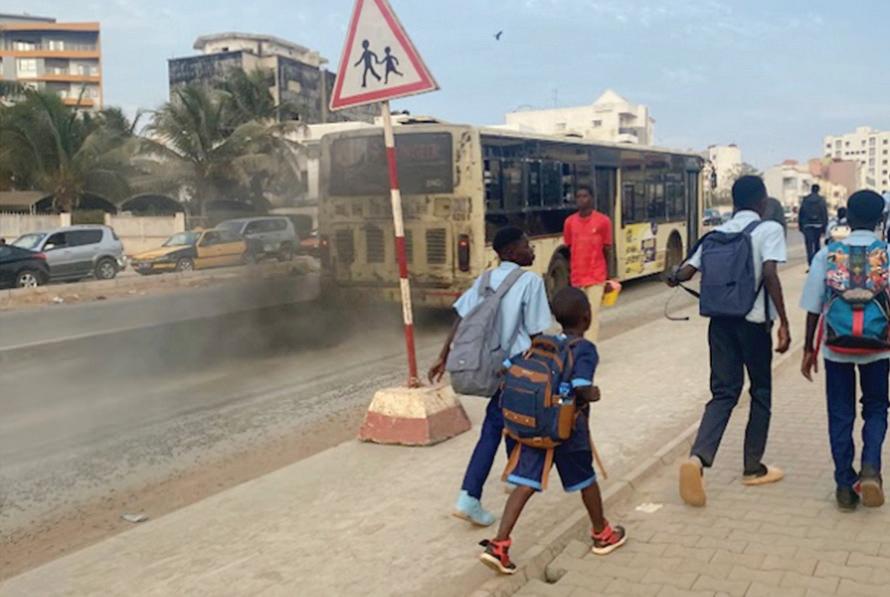
vehicles are imported at high prices, with requirements to be repaired in Western European countries, but without contribution from Senegalese workers.
Djibril Mané particularly fears the lobbying power regarding such economic advancements that disregard local needs of the Economic Community of West African States (ECOWAS).
“We have to be sincere. We Africans must know. We know it, the majority know it,” he said. “But there are always lobbies that are there, which do not want the people to follow these ideas,” he said.
“ECOWAS is not there for the interest of Africans. ECOWAS is there to obey the orders of the settlers and continue to be the long arm, as we call it, of neocolonialism.”
Both Djibril Mané and El Hadji Faly believe that the new leadership of Senegal will try to provide real solutions for both economic justice and environmental protection. According to Djibril Mané, the political movement of the new president resonated with youth because of the message “we are poor today, but in reality, we should not not be
poor because we have mineral resources, we have human resources, the right people. If we are still poor, it is because a small group of people take the wealth of the country.”
is movement now has a mandate to address economic issues. One of the critical challenges for the new administration will be to pay attention to justice for those who have been underprivileged while also maintaining mindfulness for environmental aspects.
Elsa Park, a U.S. teen who spent 10 months in Senegal during the 2023-2024 school year through the U.S. Department of State’s Kennedy-Lugar YES Abroad program, agrees that there are opportunities as well as challenges in regards to balancing the need for economic development with mindfulness for environmental action. During her stay in Senegal, she saw change as the regime of Macky Sall was replaced by the new administration of Bassirou Diomaye Faye. High school students were urged to spend multiple Saturdays cleaning up their schools and to also participate in cleanups in the city, in their neighborhoods, and on beaches. “For young people, it was nice to feel that you were making a di erence,” she said.
Under the new administration of Senegal, additional environmental ac-
tion initiatives have been started. Speci cally, $5.5 million will be dedicated to promoting environmental health. is will be achieved by reducing the release of unintentional persistent organic pollutants (UPOPs) and toxic chemicals as well as establishing laws for the rational management of urban waste, a major contributor to harmful particle releases. Moreover, Senegal’s National Waste Management Unit in collaboration with other agencies has installed 18 standardized collection points where communities can deposit their waste.
e United States has taken an interest in collaborating with Senegal’s new administration. In July, Deputy Secretary of State Kurt Campbell traveled to Senegal and met with President Diomaye Faye and entrepreneurs. Campbell highlighted the two nations’ shared dedication to good governance. He announced U.S. investments in Senegal’s economy, including the Millennium Challenge Corporation’s $550 million power compact to increase energy access solutions can boost economic growth and help address environmental challenges.
While concerns remain about the government’s collaborations with highly polluting organizations such as Australia’s Woodside LNG, Senegalese youth have found grounds to believe that it is possible to increase the prosperity of regular people while also engaging in good stewardship of the environment.
Said Hadji Faly: “I think we just need good leaders, some people who are ethical and who ght here for the population, not only for themselves.”
(Alexia Nastasia is a sophomore in the Kilachand Honors College at Boston University. She pursues a double major in International Relations and Sociocultural Anthropology as well as minors in Urban Studies and Philosophy. She is a proud member of a family of new immigrants from Romania to the United States and was a participant in the U.S. Department of State’s Kennedy-Lugar YES Abroad program in 2022-2023. In summer 2024, she is a Planet Forward Frontline Climate Fellow.)


For Ryan Jones, curating the Southern Heritage Classic exhibit at the National Civil Rights Museum was more than a job — it was a privilege, a throwback to his childhood.
Jones, a Memphis native, remembers attending his rst Southern Heritage Classic in 1997 as a young drummer, captivated by the hal ime show’s energy. Now, as the Director of History Interpretation at the museum, he has taken on the task of preserving and celebrating the rich legacy of the Classic, a Memphis institution for 35 years.
“I grew up attending the Classic, and to now be in a position where I can help tell its story—this is a moment of pride for me,” Jones said. “ e Southern Heritage Classic is about more than just a football game. It’s a celebration of Black joy, Black excellence, and the unique culture of historically Black colleges and universities (HBCUs).”
e exhibit, titled e Southern Heritage Classic: Celebrating 35 Years of an HBCU Memphis Tradition, showcases a collection of memorabilia, artifacts, and stories tracing the event’s growth from its humble beginnings to its current status as a major celebration of HBCU sports, culture, and community.
e installation is particularly meaningful, as both the Classic and the museum share a connection beyond geography—they were both founded in 1991, and have since grown into iconic institutions that help shape the identity of Memphis. e exhibit will remain open through Black History Month, ending in February 2025.
Fred Jones, the founder of the Southern Heritage Classic, credited his publicist Jae Henderson for sparking the idea of creating the exhibit to mark the Classic’s 35th anniversary.
“We were brainstorming ideas, and Jae
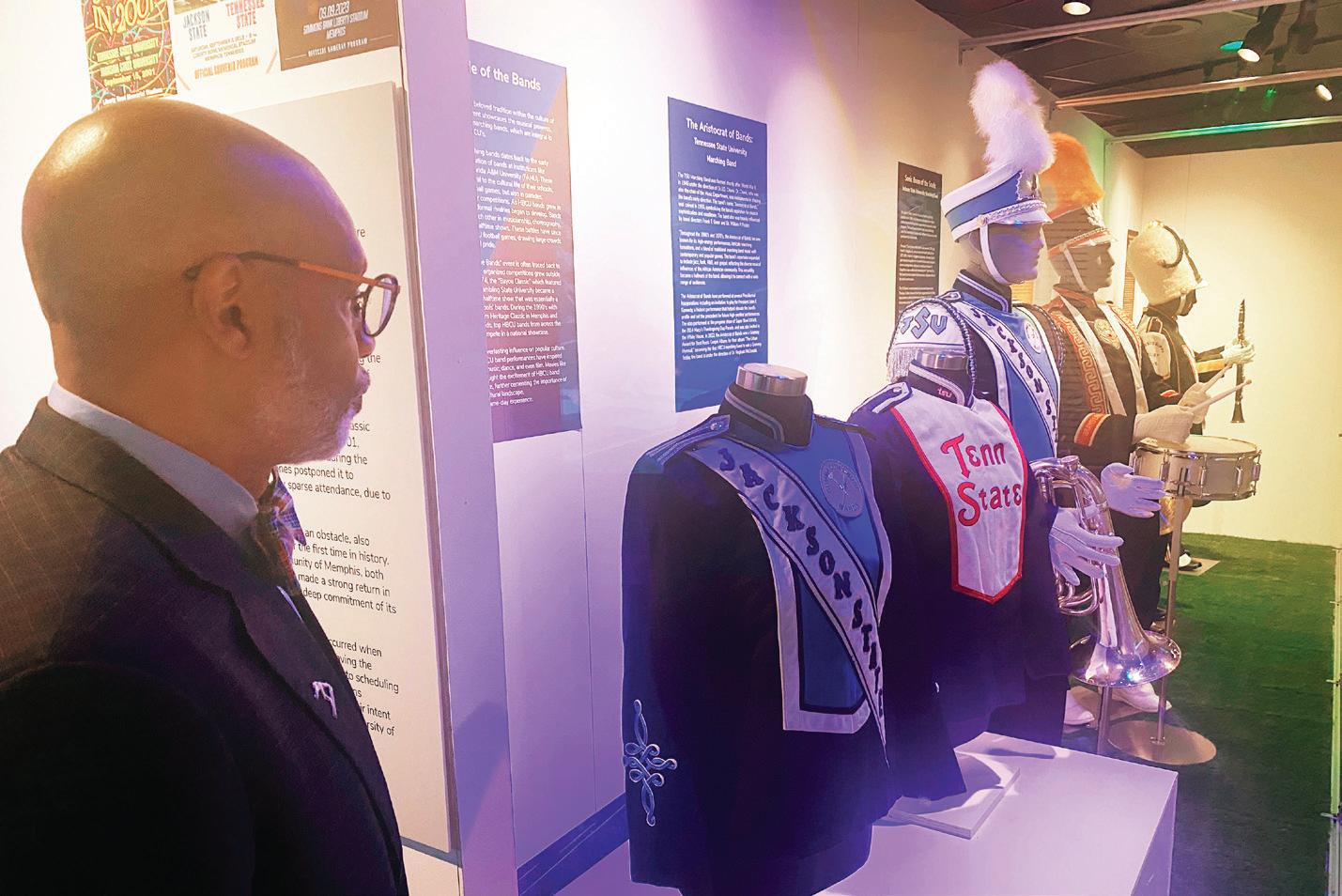
Henderson suggested this exhibit,” Jones recalled. “Sometimes ideas come and go, but this one worked from the beginning. When I heard it was going to be at the National Civil Rights Museum, I thought, ‘Wow, really?’ It was the perfect t.”
But even though he combed through the archives to help it come to life, Jones deliberately stayed away. “I didn’t want to see it until it was done,” he said. “I wanted to experience it just like everyone else.”
at changed on Sept. 6 when Jones saw the installation for the rst time during a special media preview.
“When I walked through the door, I just said, ‘Wow,’” Jones said. “Seeing these ve schools represented and the history of the Classic on display at the National Civil Rights Museum is an honor. It’s an emotional moment for me.”
At the center of the exhibit are displays highlighting the participating HBCUs — and not just relative new-
comer University of Pine Blu -Arkansas, and recent rival Jackson State either. Grambling State University, Mississippi Valley State University and Alabama State University. at includes not just football uniforms but band uniforms as well, to honor the legendary hal ime performances.
e exhibit is noisy too, with video and audio of band performances plays, as well montages of the music all-stars who have performed, like Frankie Beverly and Maze, Je rey Osborne, Patti Labelle and more.
Dr. Russ Wigginton, president of the National Civil Rights Museum, emphasized the exhibit’s power to introduce new audiences to the signi cance of HBCU culture.
“Most people who come here don’t know the full history of the Civil Rights Movement, or the role African Americans have played in shaping U.S. history. is exhibit will be a revelation to many,” said Wigginton. “While it might
seem like it’s just about football on the surface, it’s much deeper. e Southern Heritage Classic represents a cultural immersion that highlights Black joy, excellence, and resilience.”
Fred Jones echoed this sentiment, recalling how HBCU culture has always reached beyond regional borders. “One year, we even had people from Australia come to the tailgate,” Jones said. “ e Classic has an international presence, and this exhibit will help more people understand the rich history behind HBCUs and their in uence on Black culture.”
e Southern Heritage Classic has long been more than a sporting event. Each year, it attracts tens of thousands of fans from across the country, who come not just for the football but for a weekend lled with entertainment, fellowship, and the pride of HBCU traditions. Now, with the exhibit at the museum, that legacy will be preserved and shared with a global audience, many of whom may be discovering HBCU culture for the rst time.
Dr. Wigginton sees the exhibit as an opportunity to deepen visitors’ understanding.
“ e Southern Heritage Classic and the National Civil Rights Museum both re ect the spirit of community and education. By featuring the Classic here, we’re showing people from around the world how HBCU culture and sports have played a pivotal role in shaping African American history.”
As visitors walk through the exhibit, Jones hopes they will see a piece of themselves in the stories told.
“Whether you’re an alum of one of these institutions, a fan of the bands, or someone who’s been part of the tailgating tradition, there’s something here for everyone,” Jones said. “ is is a celebration of our past, present, and future.”
By LiAudwin Seaberry Special to The Tri-State Defender
Tennessee State scored early and o en in the 35th Southern Heritage Classic game against University of Arkansas-Pine Blu , but staved o a late UAPB push to emerge victorious 41-28.
UAPB struck rst with a 33-yard touchdown pass from Mekhi Hagens to JaVonnie Gibson, but the Tigers quickly responded. Jalen Rouse’s 3-yard run and James Lowery’s eld goal capped a strong rst quarter for TSU. From there, the Tigers surged ahead in the second quarter, adding 21 points, including two touchdown passes from Ellis, to extend their lead to 31-14 by hal ime.
TSU’s balanced o ense, featuring 196 rushing yards and 228 passing yards, proved too much for UAPB. CJ Evans led the rushing attack with a standout 38-yard touchdown run. On the defensive side, TSU’s pass rush was relentless, recording seven sacks and preventing UAPB from sustaining any momentum in the critical moments.
TSU improved to 3-1 on the season, while UAPB dropped to 1-3 in the 2024 campaign. is victory marked the second consecutive victory that TSU head coach Eddie George and his squad captured over UAPB in the last two seasons. Here are some takeaways from last Saturday’s clash at Simmons Bank Liberty Stadium:
MVP performance from TSU’s Ellis: Former Kirby High School quarterback Draylen Ellis performed at an elite level Saturday evening, completing 20 of his 31 passes for 228 yards and 3 touchdowns.
“I am glad that we got the win, but I am glad that everyone enjoyed the process of it all through the week and that no one gave up,” Ellis said.


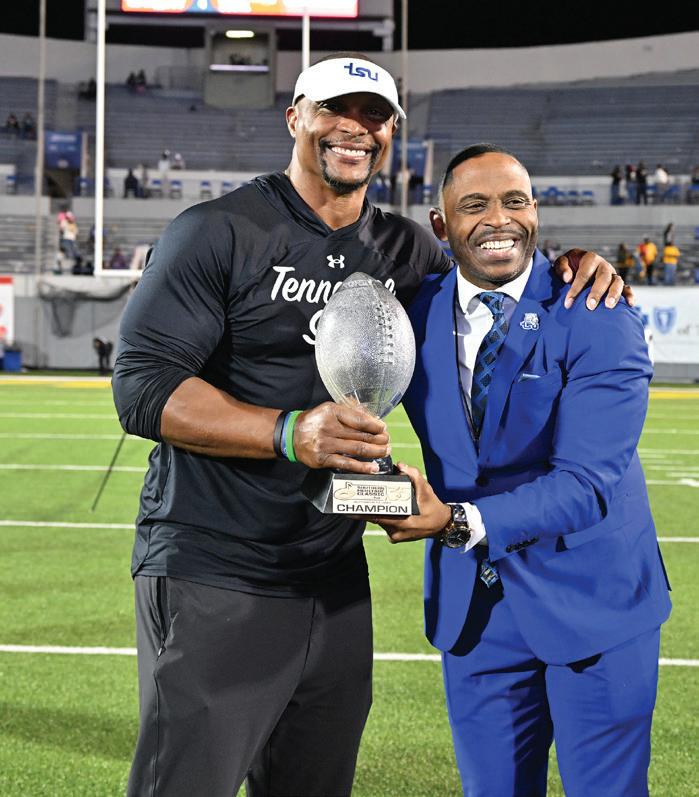
Ellis threw touchdown scores to three di erent TSU receivers in Chevalier Brenson, Jordan Gant, and Jalal Dean. His steady play served as a key reason the Tigers were able to keep UAPB at arms length despite a second half rally by the Golden Lions.
TSU Ground game eviscerates UAPB: Ellis’s play wasn’t the only factor that equated into the Tigers all-around attack. Running backs CJ Evans and Jaden McGill each totaled 63 yards on the ground, and the Tigers combined for 196 rushing yards as a team, while limiting UAPB to just 53.
e discrepancy proved crucial in the 4th quarter as TSU delivered the nal touch on their victory by capturing several rst downs in the waning minutes.
UAPB QB Hagans battled back: With his team trailing 38-14 in the 3rd quarter, UAPB quarterback Mekhi Hagans decided to take the game into his own hands. e junior quarterback nished 15 of 31 for 276 yards and 3 touchdowns, and his playmaking and
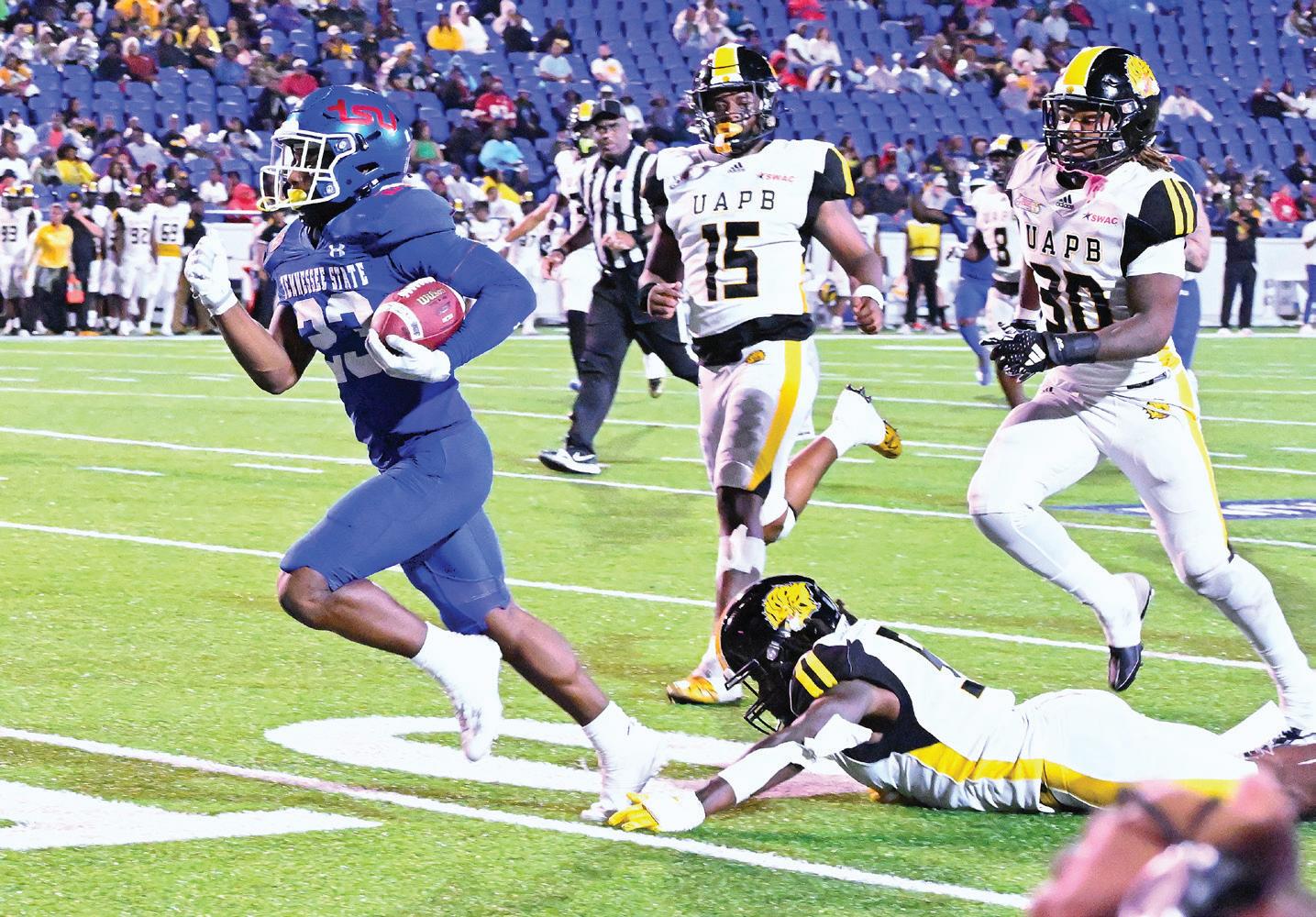
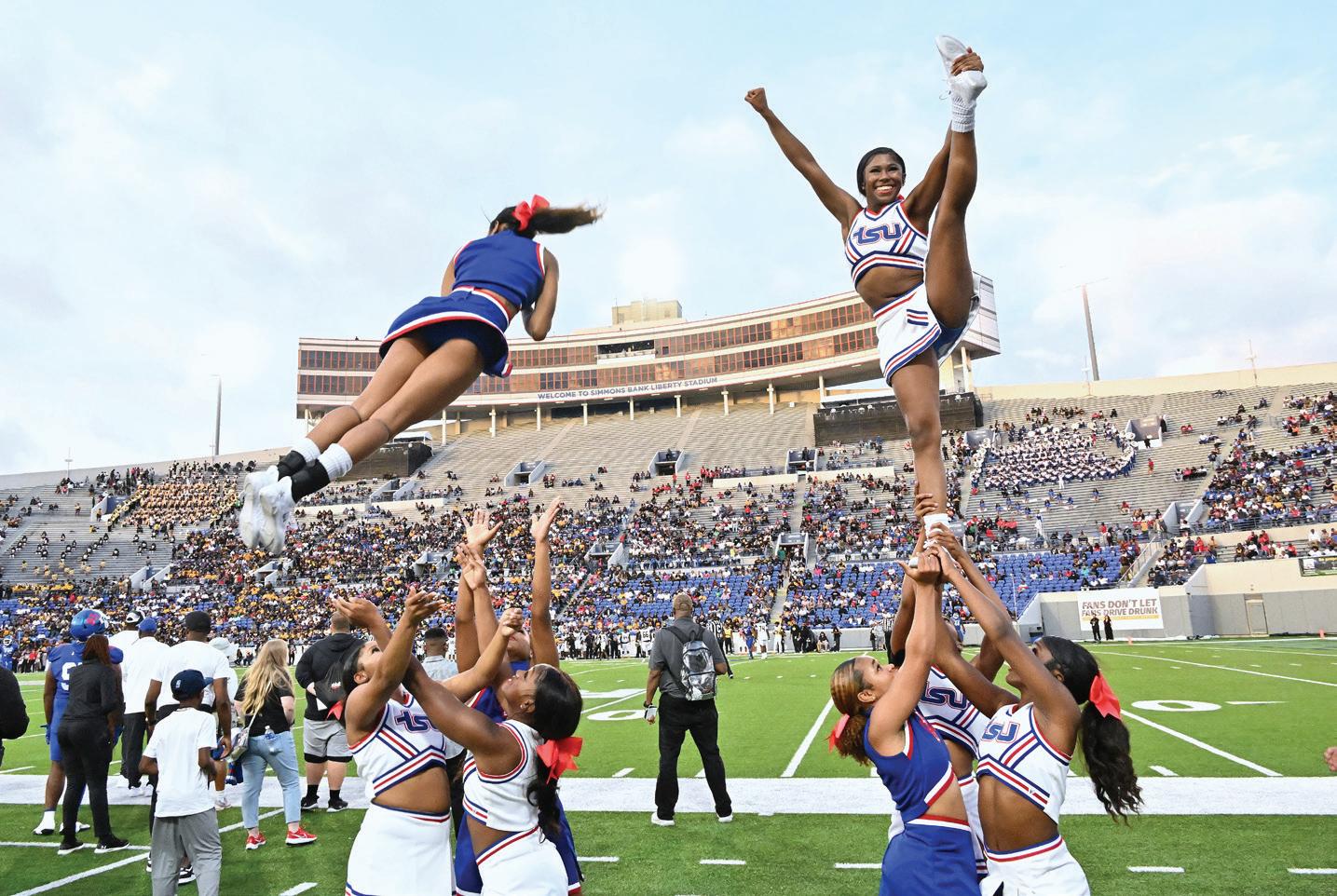
scramble abilities contributed to the TSU lead being narrowed to 38-28.
However, Hagans failed to engineer a scoring drive in the fourth quarter, and TSU’s run game punctuated a night of high octane o ense by gaining yardage on the ground to secure victory.
Attendance down due to renovations: With Simmons Bank Liberty Stadium being under remodeling, only
27,584 attended Saturday’s game. It’s the lowest total since 1991, and the rst time that there were under 30,000 people in attendance since September 2001, which was just days a er the 9/11 terror attacks. Until last year’s game in 2023, every contest within the Southern Heritage Classic umbrella from 2002 was witnessed by over 40,000 fans.




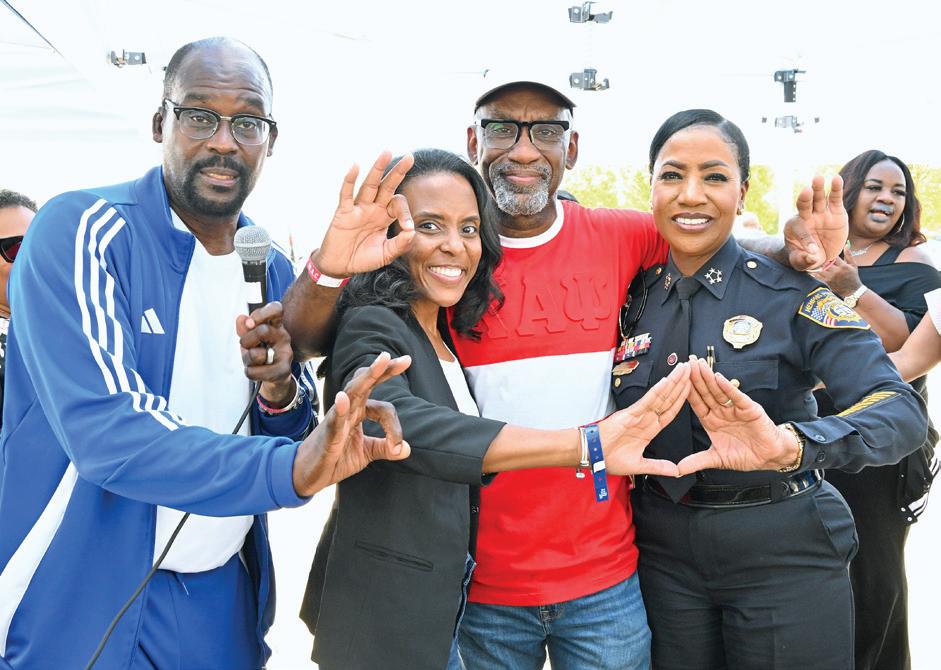
Local DJ Stan Bell and a fellow Kappa Alpha Psi fraternity member proudly hold up their fraternity signs, while Dr. Marie Feagins, Superintendent of Shelby County Schools, and Police Chief C.J. Davis exchange Delta Sigma Theta hand signs, celebrating their sisterhood.
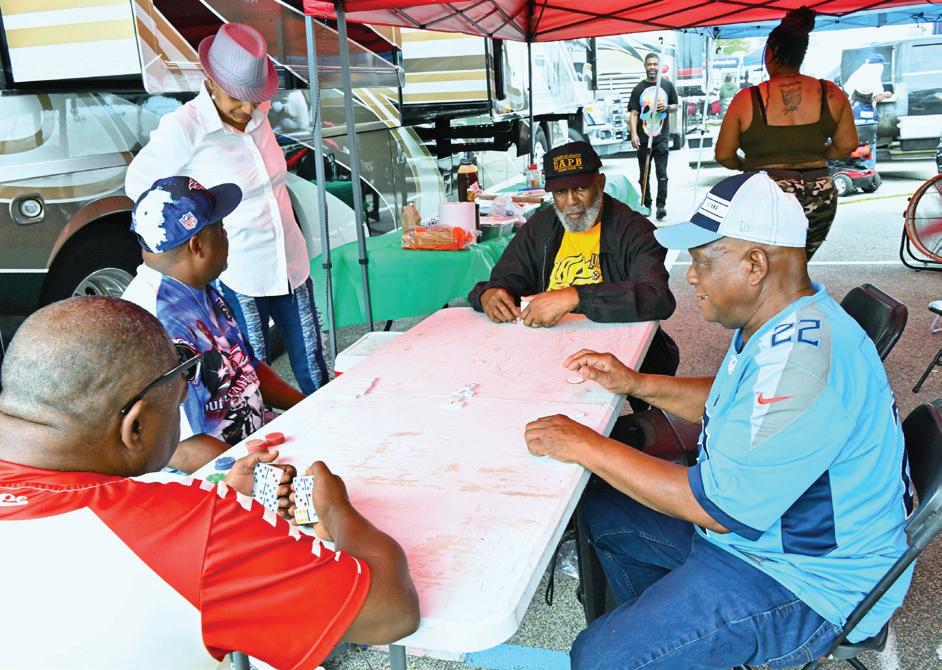
Tailgaters enjoy a classic game of dominoes, embodying the festive and communal
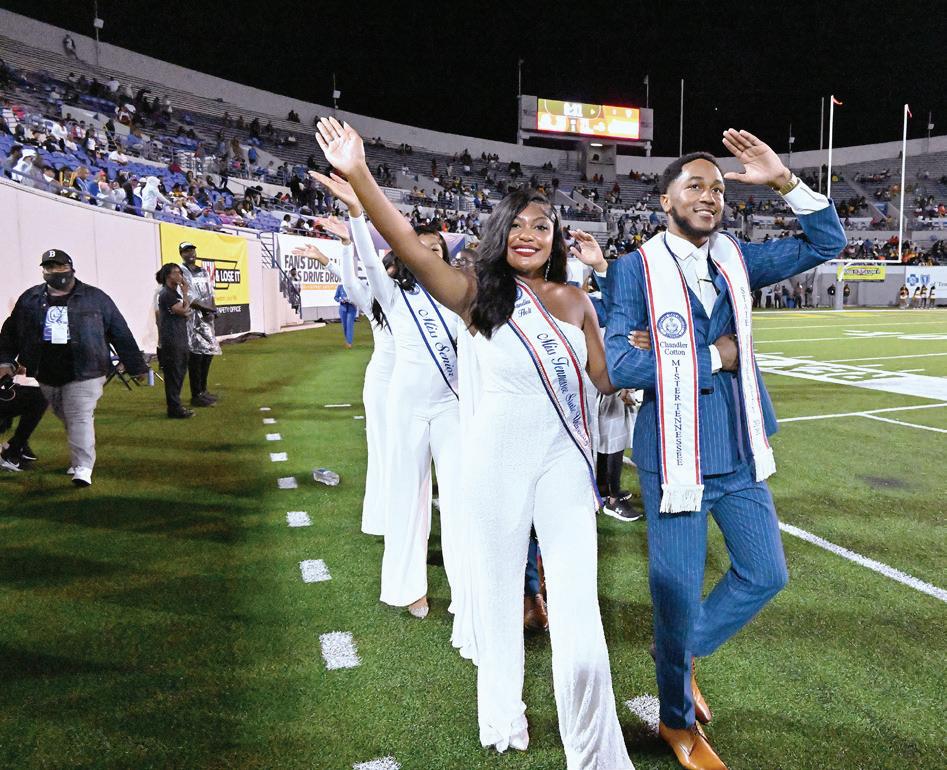
of
make
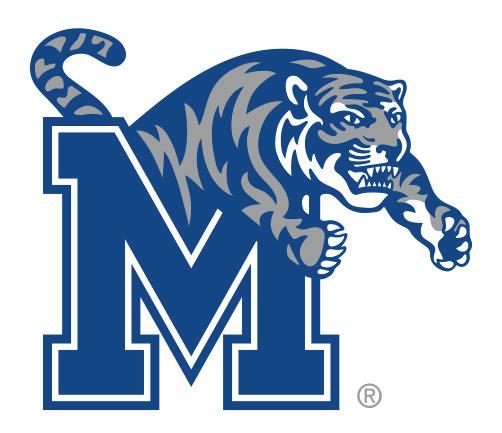


















By Terry Davis Special to The Tri-State Defender
Exhibition games o en go unnoticed, but on Oct. 15, the University of Memphis basketball program will host two signi cant games to bene t St. Jude Children’s Research Hospital.
e “Hoops for St. Jude Tip O Classic” will feature Memphis facing two historic programs: the University of North Carolina men’s team and the reigning NCAA women’s champions, the University of South Carolina Gamecocks.
“We’re excited to partner with St. Jude and Complete Sports Management for this inaugural event,” said Memphis Athletics Senior VP, Ed Scott.

“Supporting a monumental cause that impacts our community and the world is something Tiger Nation is proud to be part of.”
Richard Shadyac Jr., President and CEO of ALSAC, added, “ e Hoops for St. Jude Tip Classic is a powerful example of what can be achieved when sports and compassion come together.”
Under NCAA rules, teams can play two exhibition games before the season. Head coach Penny Hardaway has used exhibitions to ne-tune his squad against local schools like Lane and LeMoyne-Owen. is year, however, the stakes are higher with top-level competition.
Lady Tigers head coach Alex Simmons looks to build on the team’s
momentum a er nishing 13-17 (9-9 in conference) last season, including winning 5 of their last 6 regular-season games.
Hardaway’s men’s team is eager to bounce back from a disappointing season where they missed the NCAA tournament. While the full schedule hasn’t been released, key non-conference games include matchups against Clemson, Virginia, and defending national champions UConn in the Maui Classic.
e men’s game will tip o at 6 p.m. and be aired on ESPNU, while the women’s game starts at 8:30 p.m. on ESPN+. Tickets are on sale now with 100 percent of proceeds bene ting St. Jude.
